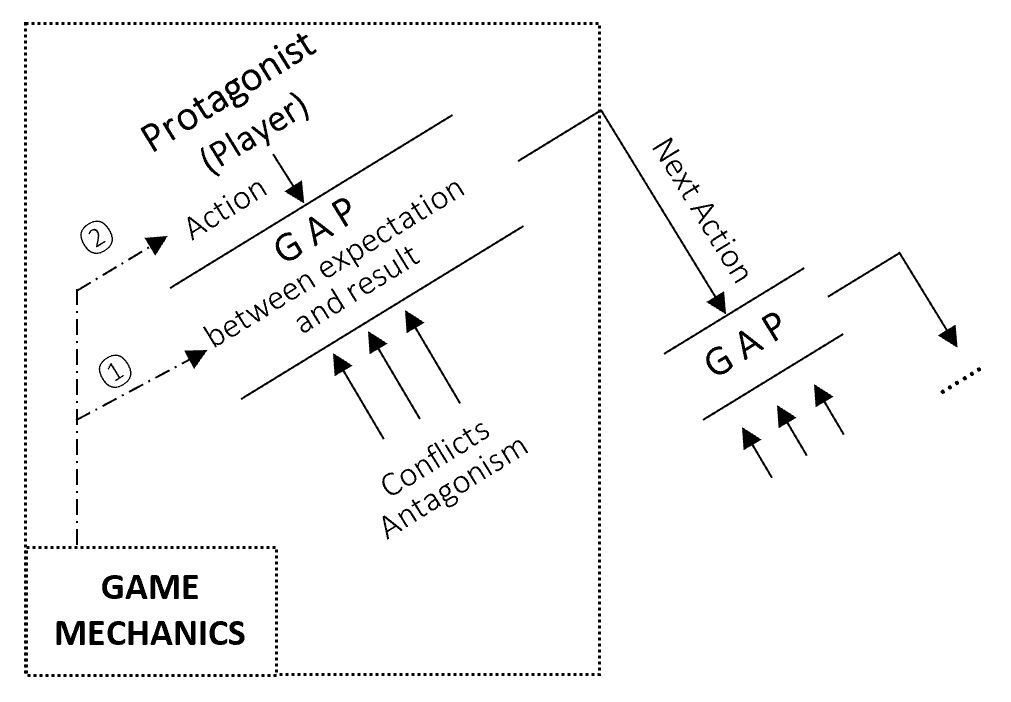Intellectual gameplay and emotional storytelling always contradict with each other, but not for Lucas Pope’s games. Return of the Obra Dinn performs an immersive game experience with solid game mechanics, and also beautifully crafted narratives.
To analyze Lucas’s great work, we need to locate where traditional storytelling and game mechanics collide. Robert McKee in his book STORY describes the substance of story as a progression of gaps. Story is born in the gap where protagonist’s expectation and result given by the world split. After the protagonist takes action, whether the result is positive or not, the writer will push the story into the next gap with greater conflict and greater risk, force more difficult and risk-taking action. Surprisingly, we can perfectly replace protagonist with player, writer with game designer. What’s different is, Game designers no longer design progression of gaps. Instead, the gap area would be replaced by a set of rules, a well-ordered system that defines how players take action based on expectation and get results, which is game mechanics(① diagram below). Comparing to the preset series of gaps in traditional stories, the gap of a game combine expectation and result into a unified system that approachable to the player.

When games integrate storytelling into gameplay, serious conflicts happen. Story line is based on preset gaps progression, leaves no place for game mechanics. For most games, the player can control the protagonist and take action(② diagram above), until they reach a critical point, then the game gives a result, like a piece of cutscene, then pushes the story and the player into the next gap. For branching narrative games like Detroit: Become Human, player’s action only decide which gap to go next, but players still tend to approach the predetermined best ending. In my mind that’s how interactive storytelling works.
With the same framework, how Return of the Obra Dinn outperforms others? Step 1, push storytelling out of the gap by only picking necessary materials of the story and transform them into a representation system. Step 2, bring game mechanics back to the gap by setting tools and rules, to make representations approachable and playable to the player.
The world of Obra Dinn is a merchant ship with corpses and skeletons. All information of 60 crew members on this ship is compressed into a log book composed of manifest, a crew list and hand-drawn sketches. The fate of each crew is simplified into a single descriptive sentence and only the death moment. After the whole story is torn into pieces and embodied by corpses spread on the ship, the player is given a magical watch. Encountered with every corpse, the player has a pocket watch to trigger a flashback to the frozen death moment. Lucas Pope transforms narratives to interactable objects, systematizes them with a set of interaction methods and rules, that’s his magical tricks.
Similar operations are also performed in Lucas’s previous game Papers Please, that all information of every citizen is com-pressed into a one-page passport and other several supporting paperwork. As the immigration officer, the player is not allowed to freely communicate with others, and their only job is to allow immigrant to pass through or not. These limitations and barriers are Lucas Pope’s true cleverness to change player’s role from tradition, and these limitations are the gap Lucas creates to leave space for game mechanics.
Most games are behaviorists with typical pattern composed of stimulus-response, award and reinforcement. Whereas Cognitive Science has rejected behaviorism since fifty years ago, that humans have innate talents to prepare them for complex information and representations. Humans create language, diagrams and documents, all these representation systems and develop strong skills to handle them, but they are always forgotten by game designers. Lucas Pope’s games don’t have much traditional game ‘behavior’ that he casts the player as worker, but they can still create immersive experiences, because he utilizes human’s pre-existing skills like cross-referencing, memorizing, logical analyzing and deducing rather than teaching them new gaming techniques. That’s why he’s games sound too serious, too arduous, but still charming and captivating. His games are great enlightenment to the game field, especially for serious and experimental games.

